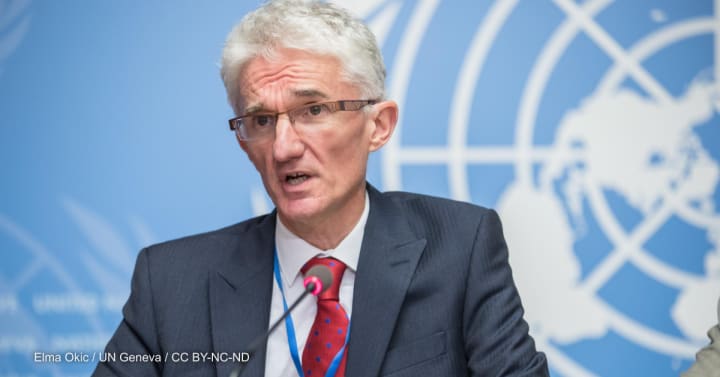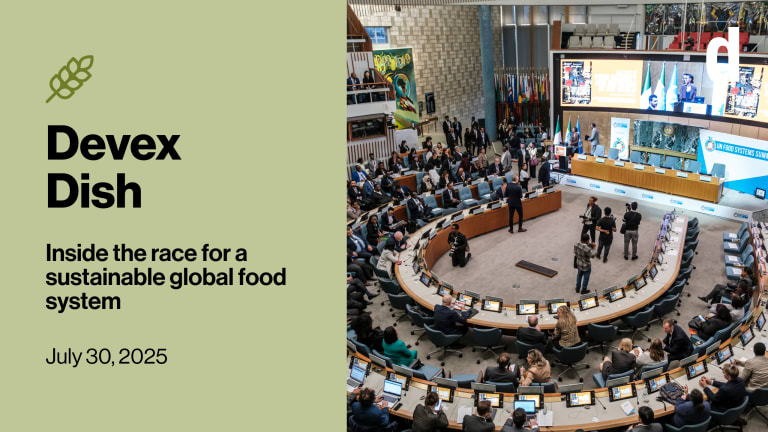
Russia and China helped Ethiopia to “delay” meetings of the United Nations Security Council to discuss the declaration of famine in Tigray, according to Mark Lowcock, the former under-secretary-general for humanitarian affairs and emergency relief coordinator.
“Effective diplomatic maneuvers in New York” by Russia and China meant “the Ethiopians were quite successful in staving off open meetings in the Security Council for months and months and months,” he told Devex in an interview. Famine still has not been officially declared in northern Ethiopia, though nearly half a million children are estimated to be malnourished in Tigray.
If there had been Security Council meetings on famine in Tigray sooner, “it would have focused higher-level attention on the problem earlier and added to the political pressure on the Ethiopians to allow more aid in,” according to Lowcock.
He added: “The delay cost lives and added to suffering, especially among women and children.” He also asserted that without Russia and China’s involvement, “there would have been earlier meetings” and that despite “nervousness” on the part of certain African states, “the majority wanted it discussed.”
Taye Atske Selassie, the Ethiopian ambassador and permanent representative of Ethiopia to the United Nations, denied Lowcock’s claims. Russian and Chinese permanent missions to the U.N. did not respond to a request for comment.
Earlier this month, Devex reported on Lowcock’s claim that the Ethiopian government blocked the declaration of famine in Tigray, saying that when he left the position in mid-2021, he knew that the northern part of the country was already in famine but that a broken international system for making these declarations allowed the country to slow down the process. Absent an official declaration, the aid sector has used phrasing such as “famine-like conditions.”
Much of the international community has raised the alarm about the widespread human rights abuses in the conflict, as well as criticized the government's de facto blockade of humanitarian aid. On the other hand, Russia and China’s stance on the conflict in Tigray has been that it is an Ethiopian internal affair. This echoes the Ethiopian government, which has referred to it as an internal “law enforcement operation.”
“The Ethiopians basically wanted to starve the Tigrayans into submission or out of existence.”
— Mark Lowcock, former under-secretary-general for humanitarian affairs and emergency relief coordinator“When it came to … what should be discussed in the Security Council, the Russians and Chinese helped the Ethiopians delay meetings in the Security Council,” said Lowcock. He said he tried to kickstart open meetings by sending the Security Council a note under resolution 2417, which alerts states to the risk of famine-induced conflict.
“If something's going to come on to the agenda of the Security Council, there's a process for determining that … the members of Security Council, particularly permanent members, can be quite adept at finding reasons why particular things shouldn't be discussed,” Lowcock said.
He continued: “When an issue becomes big enough, things will eventually be discussed, like Russia, Ukraine was discussed … there's one very weak resolution so far. But you know, there's lots of scope for delaying tactics. And that's what's happened. That's what happened in the case of Ethiopia.”
Lowcock said while there is not a formal link between Security Council meetings and the famine declaration process, the Security Council does contribute to political and media attention, which means a situation is less likely to “deteriorate into mass loss of life.” He said that “effective concerted efforts” in 2017 averted famines in South Sudan, Somalia, Yemen, and Nigeria. The Famine Review Committee of the Integrated Food Security Phase Classification, or IPC, is the body that would need to officially approve a famine declaration.
“It is harder for recalcitrant regimes to stymie the work of the IPC when under the glare of global media attention because then everyone can see what they are doing and the political cost of deliberately starving a population is correspondingly higher,” Lowcock said.
The move represented “a further notch” in the “continual degradation” of the Security Council, according to Fred Carver, a researcher specializing in the U.N. Tensions between Western powers and Russia and China — which are both permanent members of the Security Council, along with France, the United Kingdom, and the United States — were already “leading to fewer and fewer things working at the Security Council,” according to Carver, to “more hard no’s” and less compromise.
Lowcock said the Ethiopian government was wary of attracting criticism for its handling of the Tigray crisis, and “deliberately did it in a way to minimize the risk that there will be a huge global backlash,” he said.
“The Ethiopians basically wanted to starve the Tigrayans into submission or out of existence,” he said. “That was objective one, but objective two was to do that without attracting the global opprobrium that is associated with deliberately causing a famine taking hundreds of thousands or millions of lives,” Lowcock said.
Lowcock said Ethiopia, having built up a “very capable set of institutions and the developmental state,” used its experience with international agencies to downplay the famine in Tigray. Ethiopia was “sophisticated” in its interactions and relationships with international organizations, including the World Food Programme and the Food and Agriculture Organization — U.N. agencies that are major actors in the IPC consortium.
This included “working to dispute the data that had been collected by the agencies in early 2021, which revealed that 400,000 people were in a state of famine,” Lowcock said. “And then, using their bargaining power, basically, with FAO and WFP to put pressure on them not to proceed with a famine declaration. And the Ethiopians had some cards to play there because WFP and FAO needed the government's permission to keep working.”
Lowcock said this highlighted a problem with “the current [IPC famine declaration] system, that the agencies which are charged for supervising it, themselves have a variety of responsibilities. One is to find ways to keep getting help to people, so they're conflicted, unfortunately.”
This brought him to the conclusion that “the current system is basically not fit for purpose, given how some states decided to behave.”
Selassie, Ethiopia’s U.N. envoy, denied the claims made by Lowcock. “I’m completely surprised to read what he’s said … blaming Ethiopia for deliberately starving the Tigray people is completely out of this world,” Selassie told Devex.
Food insecurity and malnutrition rates in northern Ethiopia, which includes neighboring regions of Afar and Amhara, remain “extremely concerning,” according to a report from the U.N. Office for the Coordination of Humanitarian Assistance. The Ethiopian government blocked humanitarian aid, including food, into Tigray. This access has improved recently, but not at the scale needed to meet the needs. Even with additional food aid entering Tigray, the lack of fuel means food can’t be transported throughout the region.
Some internally displaced people are eating “wild plants to survive” in Tigray, the report noted. The neighboring region of Afar has seen a sharp increase in the number of severely malnourished children admitted to therapeutic feeding programs.
Sara Jerving contributed reporting.


